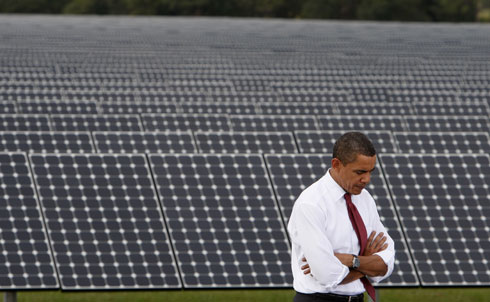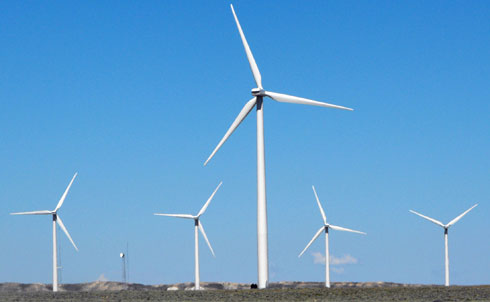
BP’s gushing oil well in the Gulf of Mexico has been a disturbing reminder of the toxic nature of our current energy economy. In a special energy issue of The Nation—featuring contributions from Michael T. Klare, Christian Parenti and Mark Hertsgaard—Klare emphasizes the fact that our transition to green energy will not be fast or painless, but it needs to start immediately. To supply the United States with power without destroying the earth in the process we need radical changes in the way we think about energy consumption and our energy infrastructure. Klare argues that the future of the US and of the world depends on developing a new energy outlook that favors energy that’s "clean, green, safe and inventive."
Credit: AP Images

On May 17, 2001, then-Vice President Dick Cheney called for a new National Energy Policy, one that would increase drilling in domestic wilderness areas such as the Arctic National Wildlife Refuge and in the deep waters of the Gulf of Mexico. The Bush administration held secret meetings with energy and resource extraction companies to prepare the far-reaching plan and neglected to invite any representatives from the environmental community. Klare argues that the April 20th Gulf oil disaster is a “direct result” of this policy—as are so many more environmental catastrophes of the past nine years. “The plan," Klare says, "aimed to extend the life of the nation’s existing energy profile, with its overwhelming reliance on oil, coal, natural gas and nuclear power.”
Credit: AP Images


What are the “clean, green and safe” fuels that America should rely on? Klare argues that they need to be renewable, affordable, available domestically and produce little to no greenhouse gas emissions. Wind, solar, geothermal, tidal and wave energy are a few of the totally green alternatives, many of which are ready for immediate, widespread use. If the US’s energy policy provided subsidies and incentives to corporations that minimized the use of existing fuels and increased development of alternatives like these, then we would be moving in the right direction. “Adopting an enlightened new philosophy to guide our nation’s future energy plans,” Klare says, “is the single most valuable thing we can do in the wake of the Deepwater Horizon tragedy.”
Credit: Reuters Pictures

Anyone who is serious about the United States kicking its oil habit in the wake of the BP disaster, Mark Hertsgaard writes, must confront the realities of Louisiana, a state whose economy, politics and self-image has been saturated in oil for more than a century. With businesses shutting their doors and fishermen losing their livelihoods up and down the coast of Louisiana, Obama’s moratorium on deep sea drilling in the Gulf of Mexico should be a popular political move in the region. But it’s not. To many people who make their living off the sea and off oil, the moratorium is one more lunacy imposed on coastal Louisiana by outside "experts."
What the gulf state desperately needs is a planned, orderly transition to green energy that provides realistic, prosperous and sustainable alternatives to those who rely on the oil industry. And perhaps most importantly of all, Hertsgaard argues, this transition must begin immediately, because Louisiana’s oil is running out.
Credit: Reuters Pictures

According to Hertsgaard, winning over those who make their living off the dirty technologies that have historically provided the most secure blue collar jobs in the region requires "plain talk that at once respects and broadens local sensibilities as well as bold actions that deliver concrete benefits—in a word, jobs." Louisiana already has one of the strongest solar tax credits in the country, and pursuing sustainable business opportunities could create 90,000 wind, geothermal, biomass and other alternative energy jobs in the state.
Credit: Reuters Pictures

In the struggle to create a clean energy economy, we’re often fixated on innovation. But according to Christian Parenti, innovation is no longer the key—implementation is. We already have the necessary breakthrough technologies, we just have to start using them.
Take the microprocessor as a prime example of how an expensive piece of technology can cross over from obscure to ubiquitous: The federal government both funded its invention and served as the device’s first major consumer. Bill Gates has said that government research and development were essential to the microprocessor’s success. The fastest way to achieve large-scale implementation of green technologies, according to Parenti, is to "reorient government procurement away from fossil fuel energy," a strategy he calls the Big Green Buy.
Credit: AP Images

Currently, the price gap between dirty and clean energy technology is such that clean technology is locked in what Parenti calls "boutique status"—only about 4,000 electric vehicles are used nationwide while "the asphalt transportation arteries are clogged with 250 million gasoline-powered vehicles sucking down an annual $200 to $300 billion worth of fuel from more than 121,000 filling stations."
If the US government, which constitutes 38 percent of US GDP, redirected its energy purchases into clean technologies, massive markets would arise for renewables and the price gap would close in such a way that "the momentum towards green tech would become self-reinforcing and spread to the private sector."
Credit: AP Images

Where can the US government begin significant investment in clean energy technologies? A good place to start would be the Department of Defense, which consumes 75 percent of all energy used by the federal government. Thus far, the military has been one of the strongest adaptors of clean technology and is now experimenting with larger shifts. For instance, California’s Fort Irwin has built a 500-megawatt solar power plant and is on track to become self-sufficient in electricity within a decade. But these energy efficient improvements and changes are happening on a fairly small scale and need a boost to have wider impact in the civilian sector.
Parenti reports that legislation currently under consideration calls for converting the military’s massive fleet of 160,000 non-tactical vehicles to electric, hybrid or alternative fuel vehicles by 2015, a move that would help dismantle many of the economic barriers that now make clean vehicles prohibitively expensive.
Credit: AP Images



